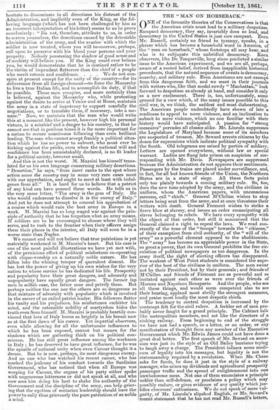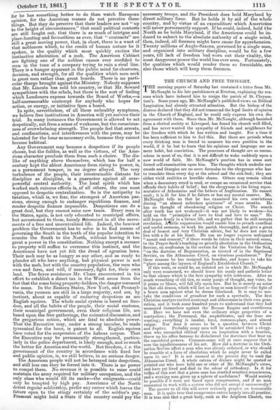THE "MAN ON HORSEBACK."
ONE of the favourite theories of the Conservatives is that the American crisis must lead to a military despotism. Rampant democracy, they say, invariably does so lead, and democracy in the United States is just now rampant. Even Mr. Russell, certainly no friend to tyranny, speaks, in a phrase which has become a household word in America, of the "man on horseback," whose footsteps all may hear, and who is to subjugate this unbridled democracy. Keen observers, like De Tocqueville, long since predicted a similar issue to the American experiment, and we are all, perhaps , aware of a rooted belief, derived from inapplicable historical precedents, that the natural sequence of events is democracy, anarchy, and military rule. Even Americans are not exempt from this dangerous faith, and we meet in their journals with writers who, like that model rowdy "Manhattan," look forward to despotism as already at hand, and consider it only as a new excitement. There is, too, unfortunately, some ground for a view which, of the many issues possible to this civil war, is, we think, the saddest and most disheartening. The American people undoubtedly have shown of late a readiness to appeal to mere violence, and an inclination to submit to mere violence, which no one familiar with their history would have anticipated. A passion for "strong measures" pervades all classes alike. Mr. Lincoln suppresses the Legislature of Maryland because some of its members are suspected of treason. Mr. Seward arrests citizens by the dozen for expressions which indicate political sympathy- with the South. Old telegrams are seized by parties of soldiery. Letters are opened everywhere, without law or special warrant. Ladies are flung into prison on suspicion of cor- responding with Mr. Davis. Newspapers are suppressed because the Administration do not approve their sentiments. Passengers by the trains are placed under surveillance, and, in fact, for all but known friends of the Union, the Northern States are in a state of siege. All these facts point only too plainly towards a coming military rule. So, too, does the new tone adopted by the army, and the civilians in uniform, whom the American papers, with unconscious sarcasm, call "chiefs." General McClellan wishes to stop letters being sent from the army, and at once threatens their writers with death. General Fremont wishes to strike a fierce blow at slavery, and issues an order emancipating all slaves belonging to rebels. We have every sympathy with the object of that order, but still it announced that the General claimed a right to repeal the laws. We read con- stantly of the tone of the "troops" towards the "citizens," of their exemption from civil authority, of the "will of the army" as a powerful element opposed to the abolitionists. The "army" has become an appreciable power in the State, so great a power, that its own General prohibits the free cir- culation of political newspapers as too dangerous. In the army itself, the right of electing officers has disappeared. The weakest of West Point students is considered the supe- rior of the best of the civilians in uniform. The men swear not by their President, but by their generals ; and friends of McClellan and friends of Fremont are as powerful and as irritated against each other as were ever the friends of Moreau and Napoleon Bonaparte. And the people, who see all these things, and would seem competent also to see their bearing, applaud most shrilly the strongest measures, and praise most loudly the most despotic chiefs. The tendency to central despotism is increased by the contempt felt for the civil rulers. A feebler set of men pro- bably never fought for a grand principle. The Cabinet talk like metropolitan members, and act like the directors of a sinking railway. From beginning to end of the struggle we have not had a speech, or a letter, or an order, or any manifestation of thought from any member of the ixecutive Government which Mr. Edwin James could not have done a great deal better. The first speech of Mr. Seward on seces- sion was just in the style of an Old Bailey barrister trying to laugh away a charge. The President infuses some modi- cum of legality into his messages, but legality is not the statesmanship required by a revolution. When Mr. Chase asks for funds, he does it just in the style of a railway manager, who mixes up dividends and agricultural prosperity passenger traffic and the spread of enlightenment into one unwholesome mess. Not one of them enunciates a principle nobler than self-defence, or proclaims a policy which may possibly endure, or gives evidence of any quality which jus- tifies observers' enthusiasm. We do not speak of mere vul- garity, of Mr. Lincoln's slipshod English, or Mr. Seward's recent statement that he has not read Mr. Russell's letters, for he has something better to do than watch European opinion, for the American masses do not perceive these things. But they do perceive that their leaders are not "up to the height of circumstances," that small political contests are still fought out, that there is as much of intrigue and pLace-hunting and favouritism as ever, that "contracts" are still a great moving power, that, in short, there is a want of that nobleness which, to the credit of human nature be it spoken, is the quality which most quickly excites the instinctive admiration of a mob. The American Cabinet are fighting one of the noblest causes ever confided to men in the tone of a company trying to ruin a rival line. There is a hunger apparent in the public mind for clearness, decision, and strength, for all the qualities which men seek in great men rather than great boards. There is no parti- cular charge brought against the Ministry. Nobody supposes that Mr. Lincoln has sold his country, or that Mr. Seward sympathizes with the rebels, but there is the sort of feeling which Londoners express towards the Board of Works,—a half-unreasonable contempt for anybody who hopes for action, or energy, or initiative fvm a board. In spite, nevertheless, of all these unhealthy symptoms, we believe free institutions in America will yet survive their trial. In many instances the Government is allowed to act despotically, not from a sense of weakness, but the conscious- ness of overwhelming strength. The people feel that arrests, and confiscations, and interferences with the press, may be tolerated for the hour as necessary evils, because they cannot become habitual.
Any Government may become a despotism if its people choose, but the foibles, as well as the virtues, of the Ame- rican character preclude them from such a choice. The dis- like of anything above themselves which has for half a century kept the ablest Americans from rising to power, is, as a permanent temper, in no degree allayed. The very turbulence of the people, their irrestrainable distaste for discipline as discipline, is a guarantee against all over- powerful central authority. The local spirit which has worked such ruinous effects is, of all others, the one most opposed to despotic centralization. So is the antipathy to taxation, which is, we fear, the strongest of American pas- sions, strong enough to endanger republican finance, and render despotic finance impossible. Despotisms can do a great deal, but they cannot raise new taxes. Every man in the States, again, is not only educated to municipal affairs, but accustomed to them, keenly ifiterested in all the move- ments of a free and uncentralized life. Indeed, the heaviest problem the Government has to solve is to find means of governing the South in the teeth of the popular intention to reunite the South to the North, without leaving it too great a power in the constitution. Nothing except a menace to property will suffice to overcome this instinct, and the Americans have not yet felt the dread of agrarian laws. Their mob may be as hungry as any other, and as ready to plunder all who have anything, but physical power is not with the mob, but with the country population, the men who own and farm, and will, if necessary, fight for, their own land. The fierce resistance Mr. Chase encountered in his effort to establish a direct tax in the West arose from the fact that the mass being property-holders, the danger menaced the mass. In the Eastern States, New York, and Pennsyl- vania, the yeomen are still in a large majority, and are, by instinct, about as capable of enduring despotism as are English squires. The whole social system is based on free- dom, and all the habits of the people, their social customs, their municipal government, even their religious life, are based upon the free gatherings, the animated discussion, and the gregarious action, which are fatal to absolute power. That the Executive may, under a strong impulse, be made tyrannical for the hour, is patent to all. English squires have voted for the suspension of the habeas corpus. That the Executive may be permanently strengthened, particu- larly in the police department, is likely enough, and so much the better for America and the world. But freedom i. e. the government of the country in accordance with fixed law and public opinion, is, we still believe, in no serious danger. The American people will not be betrayed into despotism, and still less can they be forced into it. There is no power to compel them. No revenue it is possible to raise could maintain the army required for military occupation, and the only class who would fill its ranks—the emigrants—could only be tempted by high pay. Americans of the North detest regular soldiership, prefer any career which leaves the future open to the stingy certainty of the soldier's pay. Fremont might hold a State if the country could pay the necessary troops, and the President does hold Maryland by direct military force. But he holds it by aid of the whole country, and by virtue of an expenditure which Americans will never permanently support. If he could, indeed, hold the North as he holds Maryland, if the Americans could be in- duced to submit to the absolute authority of a single mind, then, indeed, all freemen might have cause for apprehension. Twenty millions of Anglo-Saxons, governed by a single man, and organized into military discipline, would be for a few years, till lack of freedom had worn out their vitality, the most dangerous power the world has ever seen. Fortunately, the qualities which would render them so formidable, are also those which will keep them freemen.































 Previous page
Previous page